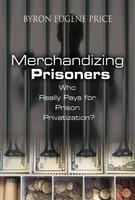This is an archive of news stories and research from the National Union of Public and General Employees. Please see our new site - https://nupge.ca - for the most current information.
New book by Rutgers University professor examines the impact of private prisons throughout the United States
 Newark, N.J. (13 April 2006) - A new book analyzing the impact of private prisons in the United States says mandatory minimum sentences, such as those planned by Canada's new Conservative government, are fuelling a multi-billion-dollar private prison industry led by profit-motivated companies whose shares often trade on stock exchanges and have no real interest in rehabilitation.
Newark, N.J. (13 April 2006) - A new book analyzing the impact of private prisons in the United States says mandatory minimum sentences, such as those planned by Canada's new Conservative government, are fuelling a multi-billion-dollar private prison industry led by profit-motivated companies whose shares often trade on stock exchanges and have no real interest in rehabilitation.
Merchandizing Prisoners: Who Really Pays for Prison Privatization? has just been published by Greenwood Publishing Group. The author is Byron E. Price, an assistant professor of public administration at Rutgers University in Newark, New Jersey. Price is also associate director of the National Center for Public Productivity at Rutgers.
His book examines the impact of private prisons in all 50 U.S. states. In it, he "sets the record straight about the decision to privatize state prisons, revealing the political bias that often drives these policy choices," the publisher says.
"Dr. Price's book examines the steady growth of private, for-profit prison firms and the correctional-commercial complex that has developed tangentially with the private prison industry. The book details the strange bedfellows that have been brought together to expand this industry. Price underscores how these for-profit private prison companies have gone public and are trading on the stock exchanges and the inimical impact of prisons being publicly traded. He debunks many of the claims as to why states seek prison privatization and demonstrates that incarceration is the new form of slavery."
'Incarceration has become a profit-making industry'
Some of the chapters in the book are: Historical Overview of Prison Privatization; Privatization Climate; The Meaning of Privatization; The Case for Prison Privatization;
The Case against Prison Privatization; Debunking the Efficiency, Effectiveness, and Quality Arguments; Critique of Economic/Efficiency Argument; Hidden Costs; Tax Implications; Liability Costs; Critique of Effectiveness Argument; Critique of the Quality Argument; Does Competition Exist in the For-Profit Prison Environment?; Private Prisons: A Vested Interest to Incarcerate; The Political Economy of Prison Privatization; Private Prisons and the Stock Market; Prison Labor; Prison Industries in American Corrections; Health Care; Human Rights and Safety.
"The author illustrates that the privatization of prisons has not only led to significant changes in policy making and the management of prisons, but it has also generated widespread concern that incarceration has become a profit-making industry," the publisher says.
"That, in turn, strengthens calls for policies on mandatory minimum sentencing that keep the prison industry growing.
"Dr. Price points out that after all, in order to be successful business enterprises, prisons will need occupants. He examines the potential reasons why a state might choose to privatize its prisons, and considers financial and political aspects in depth.
"Ultimately he concludes that the desire to save costs is not the primary reason for state prison privatization. Rather, the more plausible explanations revolve around political and ideological factors such as the (political) party of the governor and the overall political and ideological culture of the state. This work sets the record straight about the decision to privatize state prisons, revealing the political bias that often drives these policy choices." NUPGE
More information:
- Merchandising Prisoners - by Byron E. Price
- Private prison operators waiting to cash in on Canadian policies
